The bike industry is full of dream jobs. Professional race photographers, athletes, engineers, graphic designers, startup and small business founders. It’s actually a pretty wide pool, just not a deep one, with few positions open for some of the most sought-after careers. But, for those who want to build a life around bikes and have a skill, trade, or talent to offer, there’s always room for someone looking hard enough.
John Hall can attest to this. Hall is currently one of the most well-known bike mechanics in the industry – which is a bit odd considering that it is probably the deepest section of the pool, and there are thousands of positions for mechanics out there. Very few however can be found traveling alongside the world’s fastest mountain bike racers. How did Hall get so lucky to get hired on by America’s fastest downhill athlete, and one of the best UCI World Cup downhill athletes ever? Well, part of it is certainly luck, but there’s much more to it than chance.
A blue collar background
Hall, now 34 years old, grew up in the sparsely populated Black Hills of South Dakota, where cattle outnumber humans five to one, around ranches, and mountains, and blue collar industries like mining and agriculture. He picked up BMX riding as a kid, and raced regionally, traveling to neighboring states for competitions.
Driving to a race in Oklahoma one year, Hall and his friends flipped their vehicle, and Hall’s friend Rory broke his neck and couldn’t ride BMX anymore.
“Looking back we’re honestly really lucky to be alive, it was a bad one. So after that we all took a bit of a break from riding.”
Although Rory couldn’t ride BMX, the different riding position on a mountain bike was comfortable enough for him to ride and he bought a Kona downhill bike. Hall was captivated when he saw the bike and bought a Specialized Demo 8.
“After that I was hooked, I had to have a DH bike. Plus it meant we could ride with our boy again, so our little crew pretty much all swapped over to mountain bikes.”
Hall didn’t have a whole lot of time at home to hook knobby tires into the dirt though. As a kid, he’d borrow mountain bikes from a local bike shop and ride the trails around Spearfish and hadn’t really mountain biked until he bought the Specialized, which he only rode a handful of times before leaving South Dakota.
At the mall one day, he ran into one of his friends that recently enlisted in the Marine Corps and was home on leave, helping the recruiters out. His friend had a quota to meet and was required to contact a certain number of people per day to connect with the recruiters, so he asked Hall to help him out. Before he knew it, Hall had signed the dotted line.
“Those recruiters are slick. They can sell a ketchup popsicle to a woman wearing white gloves,” he says laughing.
In December 2005, he went to Marine Corps boot camp. Everything about the branch appealed to him. He wanted the hardest, longest boot camp possible, and the challenge and pride that came with being a Marine.
Active duty life as a Marine during wartime didn’t allow for much extra time to mountain bike, between regular day-to-day operations, and training exercises that led up to deployments.
Before the military, Hall planned to go to Wyotech, the well-known automotive and diesel mechanic trade school, and the Marine Corps had its own job field dedicated to maintaining and repairing its fleet vehicles, like Humvees and 5-ton military transport vehicles. But that was far from the work he would have found in any dealership after a stint at Wyotech.
Instead, when he got to Iraq in in October 2007, he was repairing vehicles using items that most people can find at a Home Depot.
“You can fix a lot of things with 550 cord and duct tape,” he says, of the lightweight nylon cord used in parachutes. Even when things like windshield wiper systems would break in the Humvees, Hall remembers lacing the wipers up with 550 cord. With one piece of cord running through the driver’s side window, and one through the passenger side, the Marines could fashion their own pull-operated wipers when the motors failed.
And, when the the door latches on the armored Humvees broke, they figured out they could fix a tow-strap across the inside of the cabin, from one door to another, to keep the immensely heavy doors closed. Call it early training for the kind of creative fixes needed trackside under pressure.
Out of the military, into a bike shop
After a tour in Iraq, Hall made it out on a West Pacific tour aboard a Navy ship, and then back to Camp Pendleton, California, the massive Marine Corps base an hour north of San Diego. As he approached his end of service date, Hall, like a lot of Marines didn’t have a clear picture of what he wanted to do.
He poked options, and tossed around the idea of working for the CIA, FBI, or DEA – all typical ambitions for fresh military veterans. After talking to friends and relatives that were federal law enforcement officers, he wasn’t convinced that the positions were as glamorous as they seemed.
He had the GI Bill, which guaranteed him free tuition at public universities and a healthy monthly housing stipend, but still wasn’t all that interested in school.
“I joined the Marines to avoid college,” he says laughing. With a guaranteed monthly paycheck however, it was hard to say no. Hall stuck around Southern California, enrolled in college and took up wrenching at a local bike shop. On the side, he was plowing through college classes, and on track to get a marketing degree.
“With my experience in the bike shop, I thought I could get my marketing degree and work for a brand like Trek or Specialized.”
After a while, Hall started working local races and got hooked up with a junior team development manager, Rich Houseman, and was helping the team out and traveling with them, getting bikes whipped into shape after races.
“Why don’t you go be Aaron Gwin’s mechanic?,” Jon Hornbeck, one of Hall’s friends said to him one day.
Gwin was racing for Specialized at the time, in 2013. For the previous 2012 season, Gwin won two of the winter races in Fontana, California, two Eastern State Cups, and then four out of seven World Cup rounds. It’s safe to say the American had made a name for himself on the downhill mountain bike scene by then.
Gwin also worked with the junior development team that Houseman was leading, and had seen Hall’s work with the team and needed a mechanic for two weekends, for a race at Fontana, California followed by one at Bootleg Canyon, a gnarly downhill track on the outskirts of Las Vegas.
“I didn’t really tell him, but it was a bit of a trial run to see if we would mesh well together, with the hopes of hiring him full-time,” says Gwin. “He had been wrenching for multiple kids at the national level and we saw that he was good at managing his broad work load and everyone really enjoyed being around him too.”
Things ended up going well enough at Bootleg Canyon, says Gwin.
“We had a great weekend and the more I got to know him, the more it was just a great fit. We got home from that race and I asked him on the spot if he wanted to wrench for me full time at the World Cups.”
Hall didn’t think about it for more than a second. “It was off to the races.” He put in two weeks notice at his bike shop, dropped out of his college courses, and hopped on a plane. Their first stop for the 2014 UCI World Cup series was Pietermaritzburg, South Africa. Gwin won.

John Canepa, who also worked for Specialized, approached Hall and asked him if he realized what had happened. “Maybe I was naive. I just thought that’s how it was though with Aaron,” says Hall. “I didn’t understand at first how much pressure these guys were under, and how hard it was to win a World Cup.”
The rest of the season 2014 season was rocky, without any other World Cup wins for Gwin.
Trackside
Typically — that is if there is a typical weekend at a World Cup — Hall walks the track with Gwin. Not that Gwin needs helps spotting lines, but if he understands the course when Gwin goes out for his practice laps and needs something tweaked on his setup, Hall can have a better understanding of what needs to be changed.
A lot of it comes down to feel, and Gwin knows exactly what he wants out of his bike.
Hall uses a tablet to keep track track of everything on Gwin’s bike, from suspension settings, fork heights, tire choices, and PSI from venue to venue.
“It’s mostly just to keep track of how many runs we do on a certain track and what settings we ran on each run, and allows me to set the bike up each day the same as the day prior,” says Hall. “Or if he says something like, ‘Hey can we go back to the settings from the 3rd run on Friday,’ or ‘What pressure did we run on run 6,’ then I have them on hand immediately and can make those changes for him.”
The other settings, like Gwin’s preferred distance from the grips to the brake levers, lever angle, and saddle height he knows by memory — although, he doesn’t measure the lever angle to a certain degree.
“I basically took an angle he was happy with and then found a position on the bike I could sit using the bars as a horizon and a certain point on the levers that I line up to the bar horizon. That gets me within a millimeter or two every time. He’s easy to work with, but he is very particular about his bike setup,” says Hall.
It’s differences like this that distinguish a World Cup tech from one at a local bike shop, and Hall doesn’t argue that he’s better. The mission is just different.
“You have to know the own brands’ designs a lot more. I’m sure there are bike mechanics in shops that are way better than me. In a shop, you could finish up fixing a Wal-Mart bike, and […] the next ticket could be for a $15,000 Pinarello with eTap.”
In his position now, working with Intense and TRP, Hall is closer to engineers, and since he is a first responder to new products on the race track, he has more input on what works, what doesn’t, and what would be nice to see on the first or next generation of a product.
“Eventually my opinion on things started to matter with manufacturers over the years and I took that very seriously, and still do,” he says. “It’s so much more work than people think but when it pays off it’s super gratifying.”
His trackside insight has been influential enough that TRP implemented a feature that he suggested, and named it after him. The Hall Lock, on new TRP derailleurs locks the derailleur at the B-knuckle to mitigate noise from chain slap.
“It came about one night in my garage. I spent countless hours trying different methods to get our derailleur at the time to quiet down.”
It all seemed to come right from the B-plate. By trying to keep movement to a minimum, it made a huge difference. Hall also says that Gwin hates noisy bikes, and has a knack for hearing a sound from his rig that others have a hard time finding.
“The Hall Lock had everything to do with Aaron’s distaste for noise on a bike and that’s exactly how it came about. Having my name on it is a big deal to me.”
Aside from knowing the brand’s own engineering, and athlete preferences though, there are a few other things that a factory racing mechanic must do right.
“Time is of the essence between practice runs, so the mechanic must be able to isolate and repair an issue in a very short period of time,” says Todd Schumlick, Intense Factory Racing team manager, Gwin’s trainer, and owner of PerformX Training. “At the same time, while maintaining a positive and relaxed environment for the team and rider.”
In other words, keep your cool if something goes wrong on the bike. Gwin recalls one incident in particular.
“There’s been so many times, but I’d say one that we joke about often was the time at Mont Sainte Anne where we were getting ready for my qualifying run and it started pouring rain literally five minutes before my drop in time. I had John swap the dry tires for mud tires in the start gate with about two minutes to spare maybe. There’s been a few of those situations in the past and I’m always thankful that he works well under pressure.”
Looking down the course
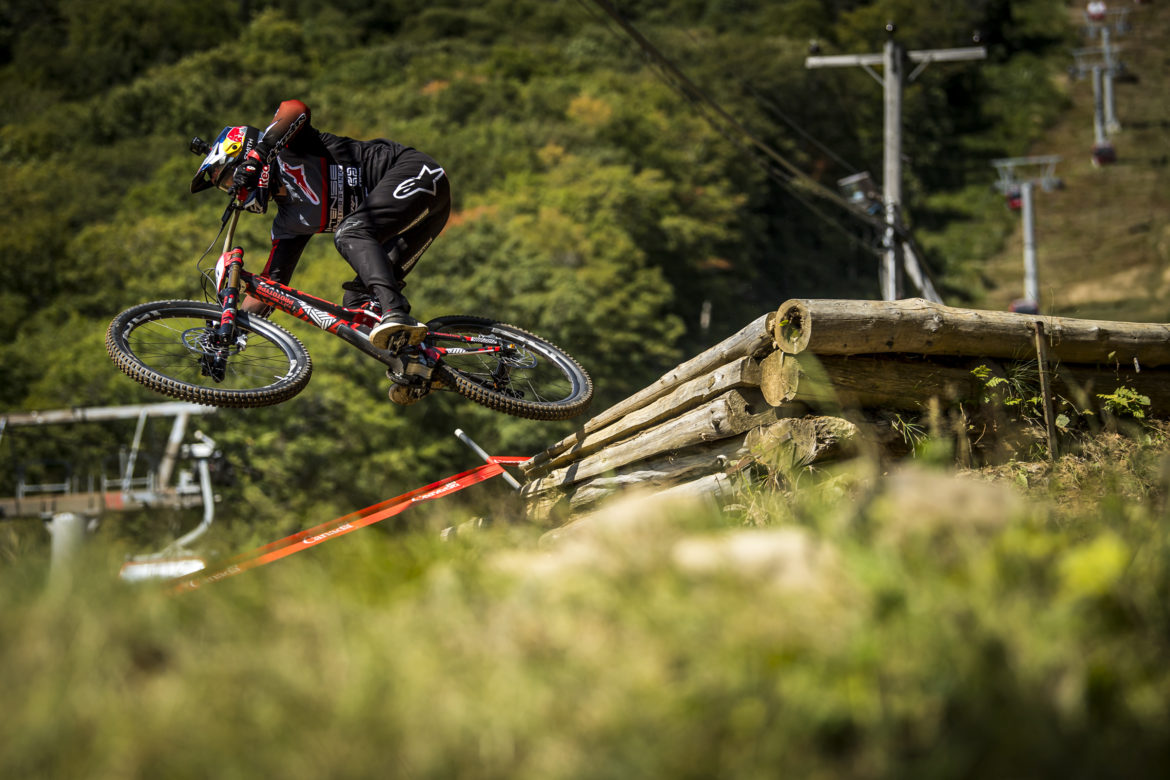
World Championships usually marks the end of the competitive season and pressure relief. Gwin and Hall head home, back to Temecula, California. Hall takes a week or two off like Gwin, to decompress, put the wrenches down, and catch up with his girlfriend and daughter.
Hall and Schumlick sit down and plan the next season of racing, inventory current product, and look at what they’ll need in parts. In between seasons, Hall and Gwin still spend time together. He’ll shuttle Gwin and still mans the wrenches for training laps, local races, product testing, and pre-season tuning.
He’s not sure how many years he’ll be working for Gwin. It depends on how long Gwin continues to race. “I plan on doing this until Aaron is done,” he says.
With every team move, from Specialized to YT and YT to Intense, Gwin has encouraged Hall to do what’s best for him, even if that means doing something else. But what else could be better than traveling with the best American downhill racer on the circuit? It’s not just that he gets to travel with Gwin either, like an unsung sidekick. The two have a meaningful friendship, built on trust and forged through years of wins — and losses.
Hall also realizes that this actuated dream would be silly to let go while it’s still an opportunity. That’s not to say he isn’t thinking about what he’ll do next. An office position in the bike industry, regular hours, and more time at home will be welcome for him and his family. But, he knows the work and chance that it took to get there.
“The one that I get asked all the time, is ‘how do I get to do what you do?” he says. Factory racing team hopefuls want to know how to make it someday. Yes, Hall is lucky, but that’s a pinch of the ingredients that it took him to get there.
“I guess you could say that luck or chance both have their hands in just about anything in life, right? But, I wouldn’t chalk everything up to just those two things. When I look back, I was creating opportunities for myself all along,” he says. Hall didn’t end up around the right people by chance. He put himself there, knowing that there was a chance for the right opportunity to come up eventually.
Whether it was breaking down boxes at a bike shop as a kid for the chance to learn how to wrench, or helping a team of ambitious kids get their bikes ready to race, he placed his shots and eventually one hit a bullseye.














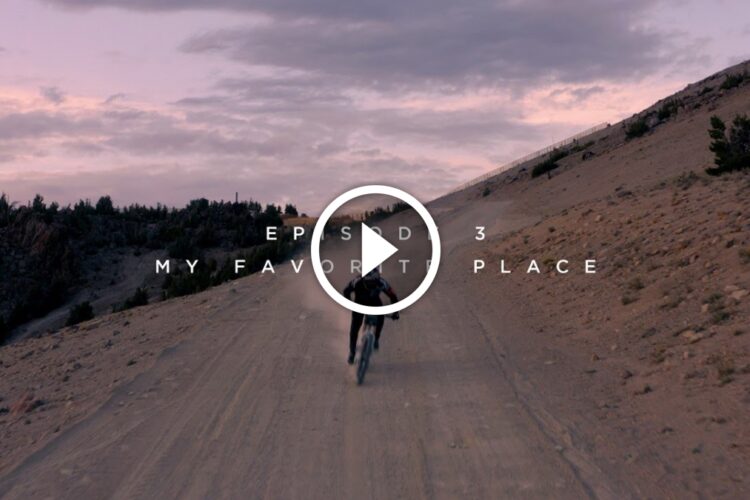
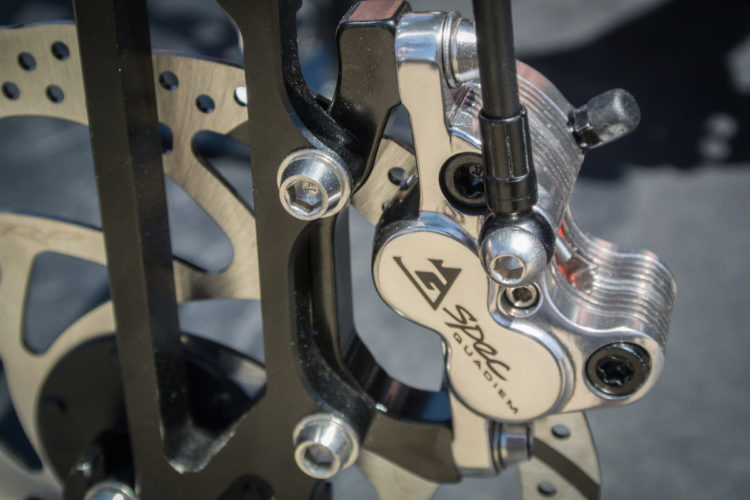
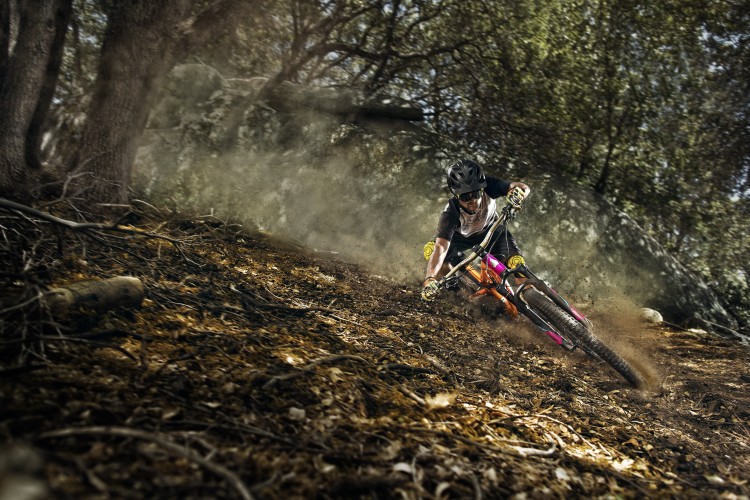
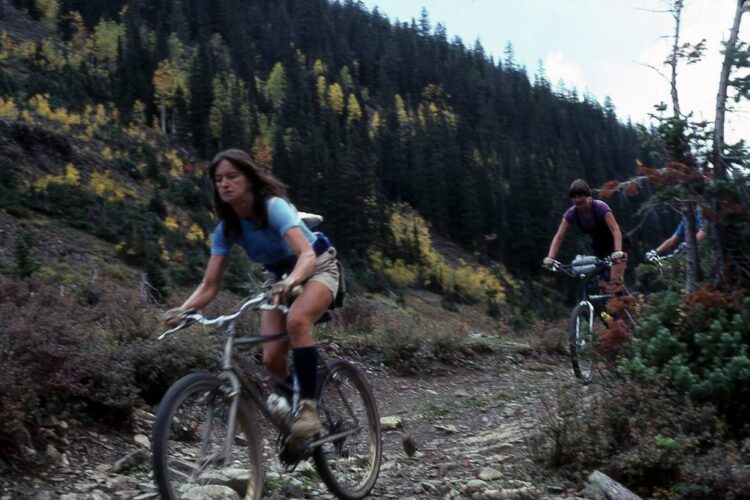





1 Comments
Jun 18, 2020
More please.